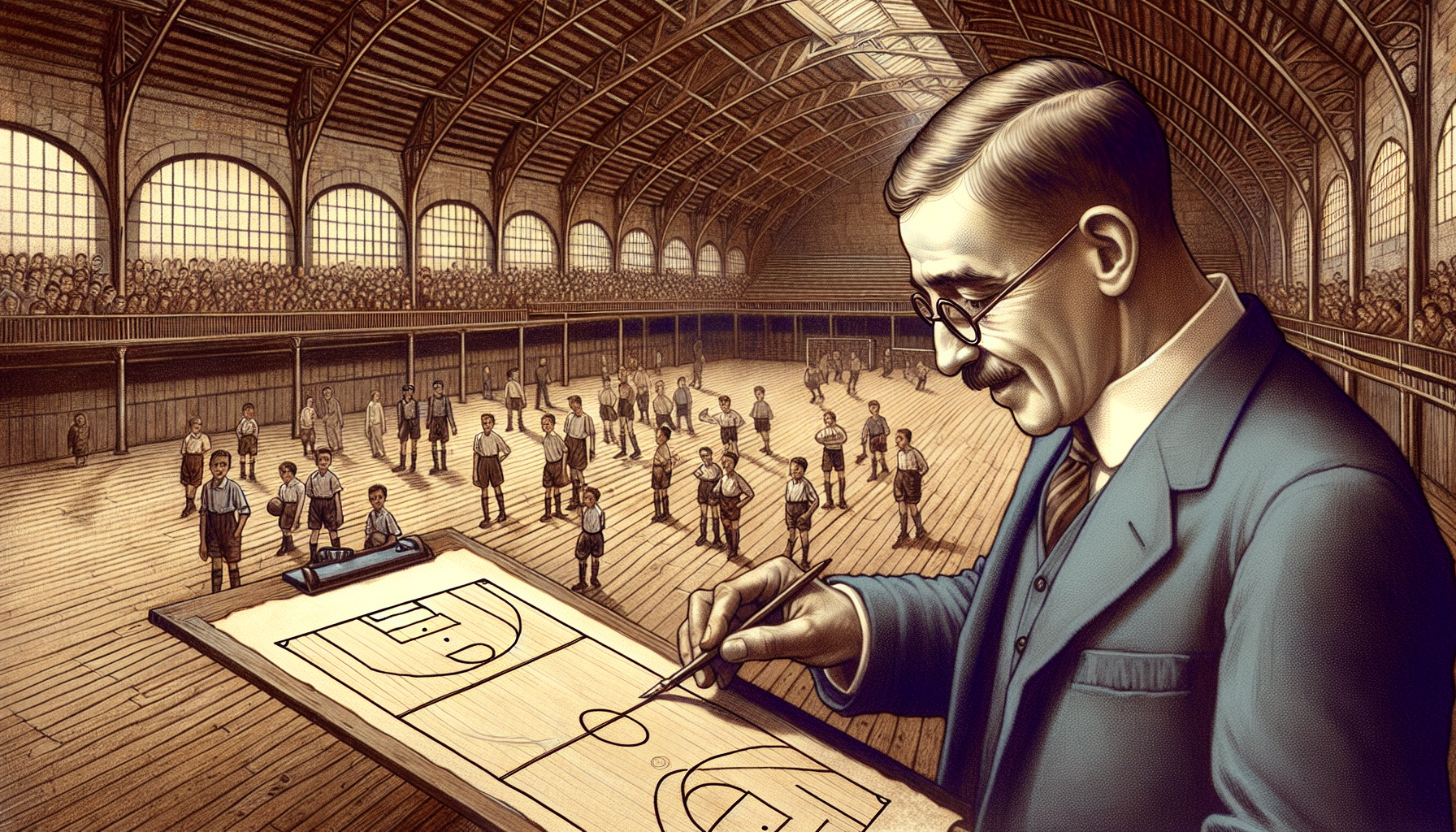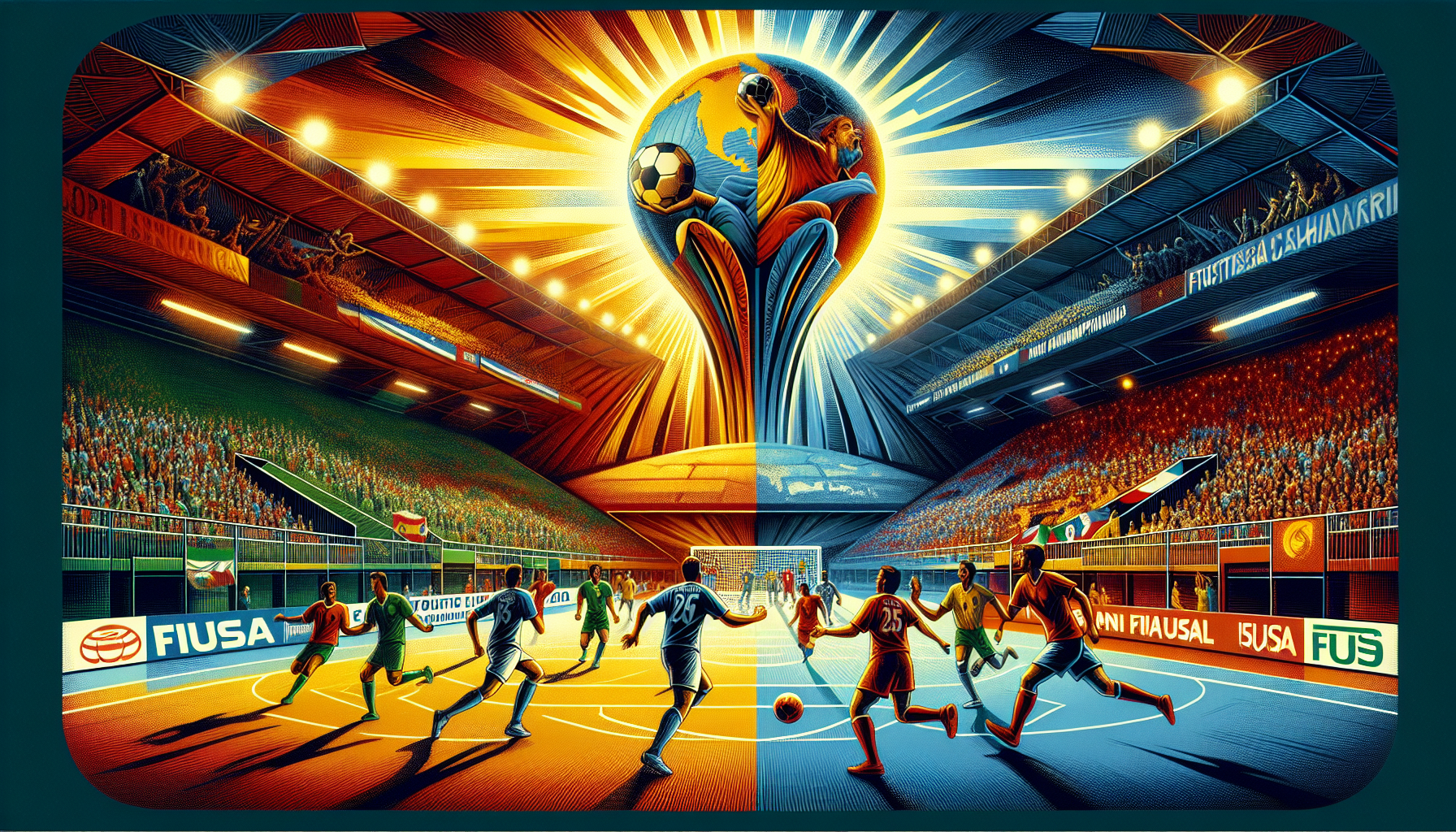Futsal has come a long way since its creation in the gyms of Montevideo. Its unique blend of creativity, precision, and pace has captivated millions around the world, from aspiring players in local clubs to soccer legends on the world stage. As we look to the future, the continued growth of futsal, its increasing global footprint, and its impact on the larger soccer community serve as a testament to the sport’s enduring appeal and potential.

Tracing its roots back to the 1930s in Uruguay, the history of futsal is a captivating tale of innovation, growth, and global expansion. This sport, emerging from a mix of soccer and indoor games, was conceived to withstand confined spaces and unpredictable weather, quickly becoming a South American sensation, before capturing the hearts of players worldwide. In this article, we’ll explore how futsal evolved from a local pastime to a recognized fixture in the world of sports, influencing soccer legends and spawning a vibrant international scene.
Futsal, which originated in Uruguay in 1930 and was further developed in Brazil, emphasizes skill, technique, and creativity, with terms ‘FUTSAL’ finally being recognized in 1985 after a dispute between the World Futsal Association and FIFA.
The global reach of futsal expanded significantly with the establishment of the International Futsal Federation (FIFUSA) and later FIFA’s involvement in organizing the FIFA Futsal World Cup, leading to a rise in popularity and international competitions.
As of today, futsal has a truly global presence with an estimated player base of 12 million, with FIFA’s endorsement and varied international competitions driving its growth, including the emergence of women’s futsal and professional leagues in countries like Argentina.

Futsal, a unique blend of soccer and basketball, was born in the gyms of Montevideo, Uruguay in 1930. Its creator, Juan Carlos Ceriani, was an Argentinean physical education instructor who had a vision of creating a sport that was accessible to all and could be played in any weather. His ingenious blend of soccer, basketball, water polo, and team handball rules resulted in a fast-paced, exciting game that quickly captured the imagination of soccer enthusiasts across South America, particularly in Brazil.
The appeal of futsal, also known as indoor football, lies in its emphasis on:
Skill and technique over brute strength
Playing on a smaller pitch and typically indoors, which means players have less space and time to act
Fostering creativity, quick reflexes, and precision
Being an excellent training ground for aspiring soccer players.
Futsal’s early development can be traced back to its unique rules, borrowed from water polo, handball, and basketball. Habib Maphuz and Luiz Gonzaga de Oliveira Fernandes from the YMCA of São Paulo, Brazil, further refined the rules in 1956. Their changes aimed to make the game even more dynamic and exciting..
The name ‘FUTSAL’ is a blend of the words ‘FUTbol’ or ‘FUTebol’ (meaning soccer in Spanish and Portuguese) and ‘SALon’ or ‘SALa’ (meaning indoor in French and Spanish). This fusion of terms aptly reflects the sport’s roots in indoor soccer and its South American origin.
The term ‘FUTSAL’ was only officially recognized in 1985, over half a century after the sport’s creation. This acceptance was not without controversy. There was a significant dispute between the World Futsal Association and FIFA over the use of the name ‘football’.
Despite these disagreements, the name ‘FUTSAL’ came to be universally accepted, symbolizing the unique identity of this dynamic sport. The resolution of this dispute marked a crucial milestone in futsal’s history, laying the groundwork for its continued growth and global recognition.

The global ascension of futsal was marked by the creation of the International Futsal Federation (FIFUSA) in 1971. As the original governing body for futsal, FIFUSA orchestrated the first international futsal competitions, leading to the sport’s rapid spread beyond South America.
This international momentum was further amplified when FIFA began organizing the international competition, FIFA Futsal World Cup, in 1989, officially incorporating futsal into the broader football community. The FIFA Futsal World Cup soon became a major international tournament taking place every four years, catapulting futsal to global prominence with international futsal match played.
As the governing body for futsal, the South American Futsal Confederation was instrumental in promoting the sport beyond South America. The organization’s pioneering efforts culminated in the first international futsal competition, the South American Cup, in 1965, which was won by Paraguay.
This was followed by the historic first international competition, the FIFUSA World Championship, held in Sao Paulo, Brazil, in 1982. In an electrifying final, the host nation Brazil emerged as the inaugural champions, setting a precedent for the nation’s future dominance in the sport and paving the way for the second world championship, as well as the eventual third world championship.
Building on the momentum created by FIFUSA, FIFA assumed responsibility for the first Futsal World Championship starting with the 1989 event. The inaugural FIFA Futsal World Cup was organized in the Netherlands, marking the start of a new era for the sport and the futsal world championship conducted by FIFA.
Since its inception, the FIFA Futsal World Cup has grown from 16 to 24 teams, reflecting the increasing global interest in the sport. In 1996, during the third iteration of the event in Spain, it was officially named the FIFA Futsal World Championship, solidifying its established status within FIFA’s roster of international competitions, including the prestigious third FIFA World Championship and fifa futsal world championships.

Futsal’s global expansion is a testament to its engaging and accessible nature. The sport emphasizes:
control
improvisation
creativity
technique
These qualities resonate with players and fans across the globe.
The surge in futsal’s popularity has catalyzed the development of soccer, leading to an increasing number of national and international futsal competitions. These events serve not only as platforms for high-level competition but also as catalysts for the sport’s continued growth and development.
Europe has embraced futsal with open arms. The sport’s introduction to Western Europe in the 1970s, brought by South American immigrants, laid the foundations for its growth in Spain and Portugal.
UEFA, recognizing the potential of the sport, began organizing futsal tournaments nearly three decades ago. Today, these include:
Men’s national teams
Clubs
Youth competitions
Women’s competitions
The establishment of the UEFA Futsal Champions League in the 2001-02 season marked a significant milestone for the sport in Europe.
On the other side of the Atlantic, the U.S. Futsal Federation has been the governing body for futsal since 1981, with a strong focus on youth development. Since 1985, U.S. Futsal has consistently hosted annual national championships, providing a platform for competition and learning.
With a membership of over 40,000, predominantly comprising youth players, the federation has successfully leveraged programs led by organizations like the American Youth Soccer Organization (AYSO) to foster and promote the sport. International engagement has also been a key part of the federation’s strategy, as seen through matches between the U.S. Futsal National Select Team and international counterparts.

Futsal’s journey has been punctuated by legendary moments and enduring contributions to the world of soccer. Soccer greats such as:
Maradona
Zico
Ronaldo
Messi
have credited futsal for playing a significant role in honing their skills, providing a testament to the sport’s impact.
Brazil’s dominance in futsal is unparalleled, with the nation clinching five FIFA Futsal World Cup titles. The country’s prowess was apparent from the inaugural FIFA Futsal World Cup, where they emerged victorious, and continued with wins in:
1989
1992
1996
2008
2012
The influence of Brazilian superstars on the sport has been profound, elevating the profile of futsal and shaping styles of play internationally. Their success on the global stage has not only inspired countless aspiring players but also reinforced Brazil’s status as a powerhouse in the world of futsal.
Spain’s rise to power in futsal is a testament to the country’s commitment to the sport. The national team has captured the FIFA Futsal World Cup title twice, in 2000 and 2004, asserting its position in the global futsal arena.
Alongside their global achievements, Spain has established itself as a dominant force in Europe, clinching seven UEFA Futsal Championships, further solidifying its status as a leading nation in the sport.
Today, futsal boasts a global player base estimated to be 12 million people, cementing its status as a truly global sport. FIFA’s endorsement and the organization of nine world championships have played a significant role in the sport’s governance and growth.
However, the rules in futsal can be subjective and vary from one tournament to another, adding to the complexity and challenge of the sport. This complexity, combined with the sport’s inherent excitement and pace, make futsal a compelling spectacle for players and fans alike.

Emerging nations like Argentina are contributing to the future growth of futsal. The Liga Nacional de Futsal Argentina, established in 2018, has expanded from 12 to 16 teams for the national phase, signaling significant growth and regional dispersion of the sport.
The league’s success has been bolstered by FIFA’s support through the FIFA Forward program, which has provided essential logistical and financial support. This backing has not only aided in the establishment and growth of the national futsal league in Argentina but also contributed to the professionalization of teams across the country.
Women’s futsal has seen significant growth, with international competitions like the Women’s Futsal World Cup providing a platform for the sport. These tournaments, combined with the expansion of women’s leagues in countries like Argentina, have been instrumental in advancing women’s participation in the sport.
The future of women’s futsal looks bright, with more and more nations investing in the development of the women’s game. The sport’s growth in Argentina, for instance, is exemplified by the creation of the Copa Federal Femenina, which has helped to grow the women’s side of the sport within the country.
Juan Carlos Ceriani invented the game of Futsal in 1930, developing a version of indoor football for recreation in YMCAs.
Futsal originated in Montevideo, Uruguay in 1930.
The FIFA Futsal World Cup now has 24 participating teams, an increase from the previous 16.
Brazil has won the most FIFA Futsal World Cup titles, with five titles.